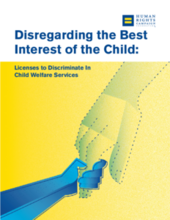Executive Summary
Seven states, including five states in the last three years, have passed laws allowing taxpayer-funded child welfare programs (adoption and foster care services) to pick and choose to whom they provide the services the government has paid them to provide. All of these laws allow agencies to refuse to work with LGBTQ people, and some also allow them to refuse various medical treatments to LGBTQ children in their care. These bills are unconscionable, and they are unnecessary. This brief explains why.
Not in the Best Interest of Children
It isn’t in the best interest of a child to deny them a qualified, loving family simply because that family doesn’t share all of the tenets of the placing agency’s faith, and it certainly isn’t in the best interest of an LGBTQ child to be denied medical treatment, or subjected to abusive discredited practices like “conversion therapy”, because the host family or child welfare agency wants to change a child’s LGBTQ identity.
Limiting the Pool of Potential Parents
Children in care need parents. Same-sex couples and LGBTQ individuals are eager to become those parents. In allowing these individuals to be excluded from the pool of prospective parents for discriminatory reasons is harmful to children in care — and leads to taxpayers footing the bill for the consequences of this discrimination. Having more qualified, loving parents in that pool serves to help the children who are waiting for families. Over 100,000 children in the U.S. foster care system are in need of a permanent, adoptive family. An estimated 2 million LGBTQ adults are interested in adoption.
Not Necessary for the State to Continue to Provide Services
The number of children served by these agencies is often quite significant and some agencies have falsely claimed that without them, the children will have a harder time being matched with families, and as a result, they will spend a longer period of time in care.
Religious Organizations’ Religious Rights Are Not Infringed By the Status Quo
Religious organizations who engage in child welfare work are entitled to their religious viewpoints, and the state cannot and should not be legislating on matters of faith. However, when engaged in a taxpayer-funded activity, such as when the state awards a contract to care for children who are wards of the state in a foster care or preadoptive setting, every state contractor should be required to do the job without picking and choosing to whom they provide services they have been paid by the government to deliver. These children are the state’s responsibility, and they should not be subjected to discrimination or denial of necessary services simply because the state has delegated the responsibility to care for them to a provider.
Discriminating At the Taxpayers’ Expense
Bills permitting discrimination by child welfare agencies are simply one more effort to write anti-LGBTQ discrimination into law. These bills are not supported by the larger adoption community or by mental health professionals. Discriminating against qualified prospective parents using taxpayer dollars does a disservice both to the children who need homes and to the entire state; and allowing those charged with a child’s care to discriminate against a child is simply unconscionable.

